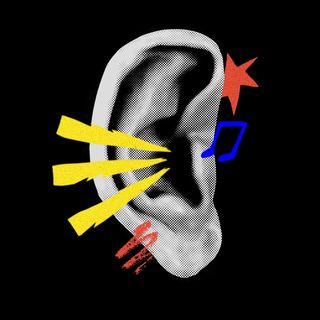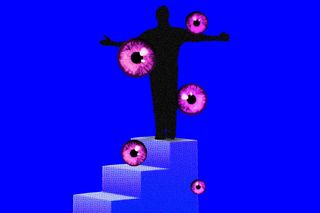
Why Some People Are Convinced They’re Constantly Being Recorded, Watched
Called the ‘Truman Show Delusion,’ this is a form of persecutory psychosis that renders people unable to discern reality from imagination.

The Truman Show — a comedy-drama from 1998, starring Jim Carrey in the titular role of Truman Burbank — was packed with numerous laughs. But it also bore an undercurrent of horror: that of having every moment of one’s life, including the intimate ones, filmed and broadcast for a large audience. Ironically, while Truman himself is oblivious to his private moments being public, individuals experiencing the “Truman Show delusion” are convinced they’re being watched when, unlike in Truman’s case, they actually aren’t.
Psychosis is understood as an altered perception of reality. Named in 2008, the Truman Show delusion is a form of persecutory psychosis. Often witnessed among individuals living with schizophrenia or schizoaffective disorder, persecutory psychosis can delude one into believing being spied on or conspired against by others — be it a singular person, or a group of people, including governments.
Joel and Ian Gold, psychiatrists, brothers, and co-authors of a paper on the Truman Show delusion, wrote about encountering a series of individuals between 1998 and 2006, all of whom were struggling with the Truman Show delusion. They described it as: “a novel delusion, primarily persecutory in form, in which the patient believes that he is being filmed, and that the films are being broadcast for the entertainment of others.”
In terms of treatment, cognitive behavioral therapy (CBT), or a psycho-social intervention through talking — in combination with antipsychotic medication — is an oft-cited course of action.
However, the Truman Show delusion has not yet been officially recognized in the latest edition of the Diagnostic and Statistical Manual of Mental Disorders, or DSM-5 — nonetheless, reports of people experiencing it appears to be on the rise.
Related on The Swaddle:
Is This Normal? “I Experience Life As if I’m Watching Myself in a Movie”
In 2012, BuzzFeed reported on the story of Nicholas Marzano, an individual who was convinced that he was the subject of an HBO-owned reality show. He even sued the network for non-consensually “filming and broadcasting a hidden camera reality show depicting [his] day-to-day activities,” hiring actors to interact with him as “attorneys, government and law enforcement officials, physicians, employers, prospective employers, family, friends, neighbors, and co-workers,” and preventing him from getting a job so he’d remain on the show.
A psychotic episode can be functionally disruptive for an individual — interfering with their ordinary, day-to-day activities, and causing cognitive impairments and emotional disturbances. Further, acting upon perceived realities can also put the individual suffering from a psychotic episode, as well as those around them, at risk. In 2009, Antony Waterlow, another individual dealing with similar delusions, ended up murdering his father and sister because he genuinely believed “computers were accessing his brain through brainwaves and satellites” and “his family was screening his life on the internet for the world to watch, akin to the film The Truman Show.”
Kevin Hall, an Olympic sailor, who suffers from the Truman Show delusion, describes his psychotic episodes as “being on The Show.” Speaking to Slate in 2018, he said, “I was back on The Show, and there were things I was supposed to do… I walked by the National Theater. I stole a truck somehow. There was a truck parked; there were keys there. I drove around. Fortunately, I was aware enough not to hurt anybody or myself at the time. I walked across the street with my eyes closed to confirm to myself that the show was really happening because if it weren’t happening, I would just get run over, and my pain could end. And that’s where it’s hard for people to imagine that your brain can keep confirming something that’s clearly not true.”
According to Hall, in hindsight, his psychotic episodes felt like his life’s script being flipped. “Like, before, I was making decisions about what was happening in my life. And when the script flipped, the decisions were made for me. And, in a sense, I had no free will anymore,” he notes. “[I]n the early stages of that, it [was] thrilling, and it was even euphoric. And then it eventually also becomes a little bit disconcerting and kind of terrifying.”
Related on The Swaddle:
Is This Normal? “I Feel Like Someone Is Always Watching Me, Even When I’m Alone”
Buzzfeed had described the Truman Show delusion as possibly “the first mental illness to come out of the 21st century’s obsession with quick and easy fame.” Indeed, according to experts, the advent — and skyrocketing popularity — of reality shows have had a part to play in triggering some of these delusions.
“Because reality shows are so visible, it is an area that a patient can easily incorporate into a delusional system. Such a person would believe they are constantly being videotaped, watched, and commented upon by a large TV audience,” Joseph Weiner, a psychiatrist, weighed in.
However, it’s not as if reality shows are causing people to become delusional per se; instead, they’re defining the course of their delusions. “The idea that more people are becoming delusional due to reality TV or The Truman Show phenomenon is tenuous, as it is likely that these people would have become psychotic with or without these influences, but the content of the delusion would be different,” opined clinical psychologist Jill Weber, adding that “If we lived in a world of no TV, and entertainment was in the form of tribal dance, someone who is psychotic may begin to believe that the dance is only for them.”
It is reported that, similarly, in the aftermath of the 9/11 attacks on New York, delusions experienced by a number of individuals involved terrorists — suggesting how real events can capture one’s imagination, and form the subjects of delusions among people prone to experiencing psychoses.
This adds further credence to the theory that reality shows are influencing people’s delusions. And with reality shows having made their way into the 2020s now, perhaps, further research into the disorder is long overdue.
Devrupa Rakshit is an Associate Editor at The Swaddle. She is a lawyer by education, a poet by accident, a painter by shaukh, and autistic by birth. You can find her on Instagram @devruparakshit.
Related


Sperm Count Is Rapidly Declining Around the World: Study
